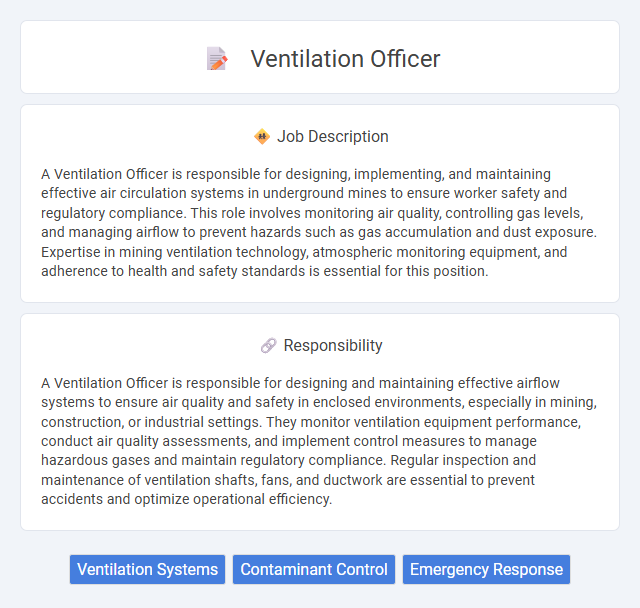
A Ventilation Officer is responsible for designing, implementing, and maintaining effective air circulation systems in underground mines to ensure worker safety and regulatory compliance. This role involves monitoring air quality, controlling gas levels, and managing airflow to prevent hazards such as gas accumulation and dust exposure. Expertise in mining ventilation technology, atmospheric monitoring equipment, and adherence to health and safety standards is essential for this position.
Individuals with strong physical stamina and the ability to work in confined or hazardous environments may be well-suited for the role of a Ventilation Officer, as the job often demands managing airflow in underground or industrial settings. Those with a keen attention to detail and a background in engineering or safety protocols might find this position aligns with their skills, increasing the likelihood of job satisfaction and effectiveness. Candidates prone to claustrophobia or lacking technical expertise could face challenges adapting to the role's requirements.
Qualification
A Ventilation Officer must possess a strong background in occupational health and safety, with specialized training in air quality control and ventilation system design. Relevant qualifications typically include a degree or diploma in environmental engineering, industrial hygiene, or a related field, alongside certifications such as Certified Industrial Hygienist (CIH) or Safety Management Specialist (SMS). Practical experience in conducting ventilation assessments, managing air flow systems, and complying with regulatory standards is essential for effective performance in this role.
Responsibility
A Ventilation Officer is responsible for designing and maintaining effective airflow systems to ensure air quality and safety in enclosed environments, especially in mining, construction, or industrial settings. They monitor ventilation equipment performance, conduct air quality assessments, and implement control measures to manage hazardous gases and maintain regulatory compliance. Regular inspection and maintenance of ventilation shafts, fans, and ductwork are essential to prevent accidents and optimize operational efficiency.
Benefit
A Ventilation Officer likely ensures proper airflow and air quality in various settings, contributing to improved health and safety for occupants. Benefits might include reducing the risk of respiratory issues and enhancing overall comfort in workplaces or industrial environments. There is probability that this role also supports regulatory compliance, potentially minimizing operational disruptions and associated costs.
Challenge
A Ventilation Officer's role likely involves overcoming the challenge of ensuring optimal air quality in complex environments, where balancing airflow and safety protocols can prove difficult. The responsibility to predict and manage hazardous gases or smoke during emergency situations potentially demands quick, precise decision-making. Facing unpredictable conditions, the job may require constant adaptation and innovative problem-solving strategies to maintain a secure and breathable atmosphere.
Career Advancement
A Ventilation Officer plays a critical role in ensuring safe air quality and airflow in confined spaces such as mines, tunnels, and industrial facilities, with expertise in designing and managing ventilation systems to prevent hazardous gas accumulation. Career advancement often leads to senior technical positions, safety management roles, or engineering consultancy opportunities, supported by certifications in occupational health and safety or industrial ventilation. Continuous professional development in emerging ventilation technologies and compliance standards enhances prospects for leadership positions within mining, construction, or environmental health sectors.
Key Terms
Ventilation Systems
Ventilation Officers specialize in the design, operation, and maintenance of ventilation systems to ensure optimal air quality and airflow in various facilities. They monitor system performance, troubleshoot issues, and implement upgrades to comply with safety and environmental standards. Expertise in HVAC technology and regulatory compliance is crucial for managing effective ventilation systems that protect health and enhance operational efficiency.
Contaminant Control
A Ventilation Officer specializes in contaminant control by designing and monitoring airflow systems to minimize exposure to hazardous substances in industrial or mining environments. They implement and maintain ventilation strategies, ensuring compliance with safety regulations and air quality standards to protect workers from harmful contaminants. Expertise in air sampling, pollutant dispersion, and filtration technologies is essential for optimizing ventilation effectiveness and preventing health risks.
Emergency Response
A Ventilation Officer plays a critical role in emergency response by managing airflow systems to ensure safe breathing conditions during fires or hazardous gas incidents. They utilize advanced ventilation equipment and real-time monitoring technologies to control smoke and toxic gases, minimizing risks to personnel and optimizing evacuation routes. Expertise in safety protocols and rapid decision-making under pressure is essential for coordinating ventilation strategies that protect lives and maintain operational efficiency.
 kuljobs.com
kuljobs.com